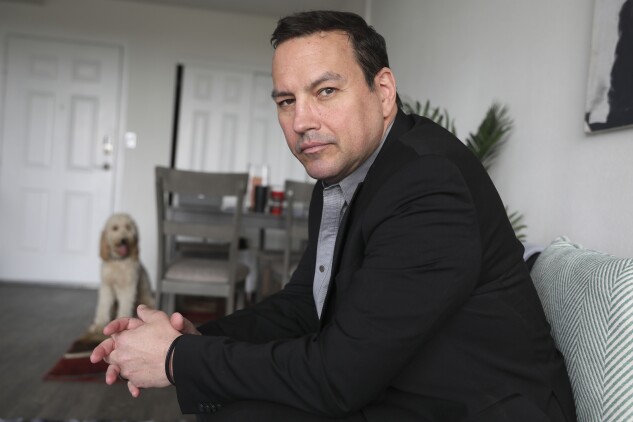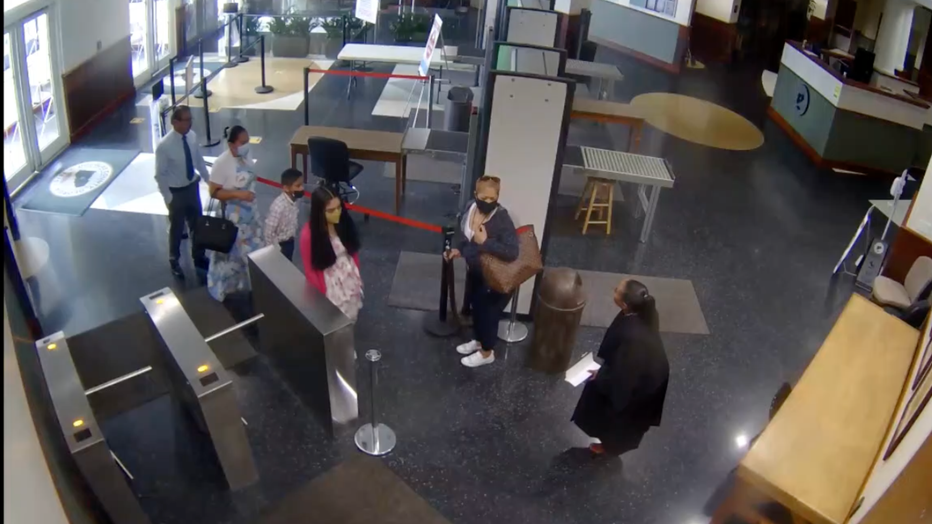Deep Dive
by Ronnie Greene
INDIANAPOLIS – Tyler Christopher, a daytime soap actor once married to actress Eva Longoria, fell in his bathroom as he withdrew from alcohol. Christopher had fallen before. But this time, at home in Indiana, he hit his head on the back of the bathtub, fracturing his skull and causing bleeding on the brain.
Rushed to the hospital that day in November 2019, he underwent life-saving craniotomy surgery, with doctors drilling holes in his head to relieve pain and pressure.
While Christopher was recovering, his sister filed a petition in 2020 to put him under guardianship. And that, the veteran ‘General Hospital’ performer said, is when his troubles truly began.
“I never thought in a million years that I would be taken advantage of by a family member,” Christopher, 50, said in an interview.
While he was under guardianship in Indiana, Christopher alleged in court papers, his sister misspent or improperly received reimbursement for $40,000 to pay down her own credit card debt, bankroll her move, even buy her son a MacBook.
His sister, Susan Asmo Baker, has defended her stewardship and described her brother’s complaints as unproven “allegations.”
Baker declined an interview request to discuss the case. But in court papers, and in an email to Bloomberg Law, she said her actions protected her brother.
“If I hadn’t been his Guardian he’d be DEAD!” she wrote to Bloomberg Law.
Shortly before the guardianship ended in 2021, she emailed her brother, “I would have never done you wrong, not before your injury, during or after and for some reason you think I need your money … I DO NOT TYLER!” She added, “Sad that you don’t even trust me. That’s what hurts the most.”
Their tussle highlights the deep friction adult guardianships can cause amongst families. The complications can ensnare everyone from nursing home residents to young adults with disabilities to Daytime Emmy-winning stars such as Christopher.
In April, the sister agreed to pay for a forensic accountant to examine her spending under the guardianship. If the review supports her brother’s contentions, Baker will be on the hook to pay him back. If it clears her, Christopher would likely help cover the cost of the forensic accounting.
Family Conflict
Bloomberg Law’s ongoing investigation explores how guardianships deprive citizens of basic rights, often requiring them to get approval for everything from where to shop to who they can marry. All the while, probate courts typically provide a flimsy safety net of protection for those under guardianship.
As in the case of pop star Britney Spears, Christopher’s experience shows how guardianships can become contentious even when family is involved. And like that of artist Peter Max, whose case has been engulfed in so many legal disputes a judge called it “toxic,” Christopher’s guardianship escalated family legal entanglements.
For families, entering into formal guardianships can be tricky terrain. Family members, not always formally trained before taking the role, must contend with the medical or mental health impairments of their kin, but also write checks, manage their affairs, and even buy or sell properties.
While large-scale fraud cases from Nevada to New Mexico to Florida have exposed criminal guardians and lawyers, family members can also be susceptible to problems, said Anthony Palmieri, former president of the National Guardianship Association.
“So, we see just as many issues with family and non-professional guardians as with professional guardians,” said Palmieri, deputy inspector general of the Palm Beach Clerk of the Circuit Court & Comptroller. Abuses are typically “a lot more egregious” when professionals are involved, he said.
In Palm Beach County, family members and non-professionals are guardians in two-thirds to three-fourths of cases, said Palmieri. Studies have found that family members serve as the majority of guardians in other localities too; since detailed data on US guardianships is scant, it’s not possible to pinpoint a national figure.
Yet some states set less stringent training and oversight standards for family members than professional guardians, said Morgan Whitlatch, a lawyer and director with the Center for Public Representation public interest law firm.
While many family members become guardians with best intentions, Whitlatch said, they may not be fully prepared for the legal process they are entering.
“I think there are more loopholes for family guardians than for others,” she said. “There are different requirements that would apply to them that would allow for more opportunities for problems to go unnoticed.”
When Christopher was placed under guardianship, he said, “I didn’t know what I was getting myself into and I didn’t have a choice.”
Starry Roles
Christopher made his name starring in ‘General Hospital,’ where the IMDb database says he appeared in 1,150 episodes from 1996-2016, and ‘Days of Our Lives,’ where he appeared in 155 shows from 2001-2019.
He was nominated for five Daytime Emmys on ‘General Hospital,’ winning the lead actor in a drama series prize in 2016 for his role as Nikolas Cassadine. He was also nominated in 2019 as lead actor on ‘Days of Our Lives’ for portraying the character Stefan DiMera.
Christopher also attracted paparazzi for his relationships with well-known actresses, most notably with Longoria. Their marriage was brief, lasting from 2002-2004.
The actor has told interviewers that his excessive alcohol use led to his departure from the shows that made him famous, saying “I threw it away.”
“When I looked in the mirror, there was only one person to point the finger at,” he said.
Between 2019-2022, the IMDb site lists no acting credits for Christopher. It was during that time he suffered the near-fatal fall, and began his trip into the world of adult guardianships.
While his soap opera travails attracted tabloid attention, his guardianship drama, playing off-screen, has not generated similar headlines.
‘In the Dark’
Christopher’s case dates to January 2020, when Asmo Baker filed a petition in Morgan County, Indiana, to put her brother under guardianship. He was in a rehabilitation hospital in Indianapolis at the time.
Baker described him as a “flight risk,” saying he had “aggressively verbalized” his wish to leave the hospital and was refusing a pending move to a neurological center. She said he was unable to drive “or otherwise make decisions for his care or care for himself.”
Living in North Carolina at the time, she asked a judge to formally rule that her brother was incapacitated and to appoint her as his temporary guardian. A day later, a judge approved her request, deeming it an emergency situation.
Two months later, Baker became his permanent guardian, tasked with negotiating with Christopher’s creditors, hiring a lawyer to represent her brother in his pending divorce from his second wife, and selling his house.
Among other duties, she was to sell his personal property “and use the proceeds for Tyler’s sole benefit,” the court order says.
Oversight of guardians is scant, Bloomberg Law found. In Indiana, for instance, guardians are required only to file biennial reports, or once every two years; Baker wasn’t her brother’s guardian long enough to even have to file that.
As the case evolved, Christopher said, he was “completely in the dark about everything.”
“I was recovering from a brain injury so the choice for guardianship was made for me without my knowledge,” he said.
Once he learned what was happening, he said, he began questioning his sister about how she was spending his money. “And she really didn’t have an answer for me,” he said.
In court papers, Christopher said he “does not doubt” that his sister’s “initial motivation to become his legal guardian was rooted at least in part in a genuine desire to help her younger brother in his time of need.”
But once he and his lawyer began digging into his finances, he said their relationship became “fractured.”
Questioned Spending
On Feb. 12, 2021, the court transferred Christopher’s guardianship from Indiana to Ohio, where he had relocated. While there, Christopher successfully pushed to end the guardianship in September 2021. His sister agreed to his request and an Ohio judge approved.
Then, he said, he discovered “various irregularities” in his sister’s handling of his accounts.
Under Indiana rules, Christopher had a year after the case closed in that state to challenge any actions by his guardian.
On Feb. 10, 2022, on the eve of that one-year deadline in Indiana, his lawyer Justin Schrock filed a motion challenging Baker’s spending.
As the case closed in Indiana, the sister had to file a final accounting of the guardianship in that state. Christopher and Schrock challenged her final accounting and then a revised version.
In one court filing, Schrock, senior attorney with Indiana Disability Rights, alleged she “had engaged in significant commingling of funds with the guardianship estate.”
He cited $40,000 in spending she “cannot legitimately account for.” Among the questioned costs detailed in court filings: More than $10,000 in her personal credit card debt paid after she received thousands from her brother’s accounts, another $13,000 to move herself and family from North Carolina to Ohio, and $5,000 for furniture, electronics, and appliances.
During the time Christopher was under guardianship in Indiana, he received more than $75,000 in income, between acting residuals and disability insurance following his brain injury. So, the questioned $40,000 exceeds more than half that total.
Schrock cited thousands of dollars more she spent “without evidence or legal support,” and said her actions represented an “egregious abuse” of the authority a guardian holds.
“Petitioner treated his income as her personal slush fund,” Schrock wrote.
In court papers, Baker said she and other family members paid expenses “out of pocket” for her brother before the guardianship was formally approved in March 2020. She also said she hadn’t been “availed the opportunity to defend against said allegations in open Court.” Her lawyer, Jerald L. Miller, could not be reached despite three interview requests.
Forensic Accounting
In June 2022, Schrock filed a motion on Christopher’s behalf seeking a forensic accountant to examine Baker’s spending.
Initially, Baker asked the judge to deny her brother’s bid, saying the forensic accounting could cost $10,000.
Ten months later, the siblings came to a rare pact: Baker agreed to submit to a full forensic accounting that could cover all 20 months Christopher was under guardianship, covering both Indiana and Ohio.
Baker has hired an accountant to conduct the review. Under the agreement, she is paying for the work. If the review finds misspending, the sides could come to a financial settlement that would close the case.
Christopher said he’s long looked for a full examination of what happened while he was “in the dark.” The forensic accounting, he said, should finally provide it.
“It’s long past due.”
Though she declined an interview request about her management of his assets, Baker noted that she became guardian in a bid to aid her brother. And while the siblings are engaged in a legal skirmish whose final act is still playing out, they have at times put that acrimony aside. “Love you Ty,” she wrote him in 2021. “Keep pressing up!”
Christopher said the guardianship was deeply restrictive and that, “She controlled everything.”
Relapse and Recovery
Christopher has openly discussed his fight with alcohol and said he remains in recovery. Before his near-fatal bathroom collapse, he had fallen at least twice while under the influence.
After his guardianship formally ended, Christopher moved back to California. As he fought to stay sober, he said he was initially homeless in Southern California before landing acting work again. He has secured at least six acting roles since 2022, often in TV movies.
This May, he was arrested at a California airport on a misdemeanor charge of suspicion of public drunkenness. He was asleep on the floor near American Airlines when police arrived, and he “displayed the objective signs and symptoms of alcohol intoxication and was unable to care for himself,” Burbank Police told The Los Angeles Times.
Christopher acknowledged in an interview he had a “relapse” at the airport. “I’m back in recovery,” he said.
His recent travails, he said, were not as dire as his experience under guardianship. While relieved he was able to end the guardianship, Christopher said, “that just opened up a whole can of worms.”
“Being homeless was a far better circumstance than being in the guardianship,” he said.
Full Article & Source:
‘General Hospital’ Star Mired in Off-Screen Guardianship Drama















.png)


